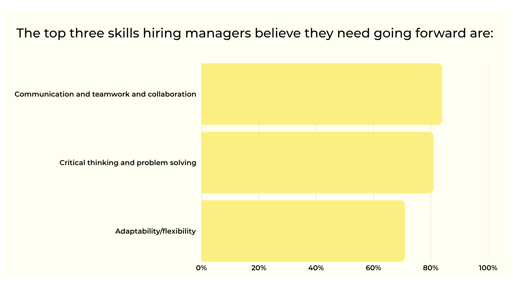Why Leadership Soft Skills Make All the Difference
The demand for professionals with a balance of soft skills is growing, particularly with the rise of AI. Leadership is a soft skill in and of itself - and it dovetails with many different interpersonal skills like communication, empathy and problem-solving.
You’ll need a solid mix of hard skills and soft skills to stand out and make an impact as a leader. As you move up, your role becomes less about “doing” and more about inspiring, aligning, and enabling others. This isn’t to say that managers don’t get stuck into day-to-day tasks, just that your role will probably shift to become more strategic.
When leading, poor communication, a lack of empathy, or an inability to resolve conflict can drain morale and drive away talented workers - amid a talent shortage in both Australia and New Zealand, this is something employers are highly aware of. The IT and Tech landscape is volatile, so leaders must be able to agile in response to challenges and uncertainty, all while guiding their colleagues.


Seven Leadership Soft Skills To Prioritise as a Tech Leader
There are many soft skills worth developing, but some matter more for aspiring leaders. Below is a list of seven key leadership soft skills, why each matter and how you can grow them:
1. Communication and Active Listening
- Why it matters: Clear, consistent communication and listening is the foundation of trust. As a leader, how you listen to and respond to others is just as important as what you say to influence and inspire.
- How to grow it: Host or get involved with structured forums (like skip-level meetings, town halls and stand-ups) that allow you to receive feedback from a range of colleagues. Always be asking yourself and others “how can I communicate and listen better?”. You could also consider taking a business skills course.
2. Emotional Intelligence
- Why it matters: Emotional intelligence - including self-awareness, empathy and self-regulation - enables you to effectively and sensitively manage conflict. Colleagues will feel able to disclose issues, allowing you and your team to proactively solve problems as they occur.
- How to grow it: Use 360 feedback tools, keep a leadership journal, apply emotional regulation practices (pause, reflect, respond), or get in touch with a career coach who emphasises soft skills.
3. Strategic Thinking
- Why it matters: Senior leaders generally aren’t just task-oriented: they design strategies, set priorities, and align the team’s work with the overarching organisational vision and goals.
- How to grow it: Engage in scenario planning, join project steering groups or taskforces, and use evaluative frameworks (OKRs, SWOT).
4. Time Management
- Why it matters: As a leader you’re balancing various priorities, often whilst delegating tasks and setting priorities for the staff members you manage. Doing this effectively requires strong time management skills.
- How to grow it: Plan your days more efficiently by time-blocking in your calendar. Use project management software (such as Monday or Asana), and have regular check-ins with your colleagues to ensure that your tasks and goals properly align.
5. Resilience and Adaptability
- Why it matters: Remaining positive during times of uncertainty as a leader is key for team morale. Absorbing setbacks, approaching challenges with realistic and creative solutions and knowing when to pivot, are important for successfully guiding your team through change.
- How to grow it: Expose yourself to stretch assignments, reflect on setbacks for learning, adopt a growth mindset, and practice change leadership frameworks (e.g. ADKAR).
6. Coaching and Talent Development
- Why it matters: Your ability to mentor, coach and delegate is critical to long-term business success, as you’re actively fostering the new generation of leaders.
- How to grow it: Complete a business skills course, hold regular 1:1s that cover training and development needs, and cultivate stretch opportunities for your team.
7. Judgement and Decision-Making
- Why it matters: As you move up, you’ll make high-leverage decisions that impact multiple areas of an organisation. Good judgement - exercised with balancing data and intuition - is vital.
- How to grow it: Use decision frameworks, perform after-action reviews, simulate tradeoff decisions, and gather feedback from colleagues of all levels on your decision process.
There are numerous complementary soft skills that are invaluable for leaders - but the ones above tend to drive the biggest leadership lift.
Fact: An Extra 1.4 Million Hours Per Week Needed on Communication and Collaboration Skills by 2026
According to the Australian Government’s National Skills Commission (NCS), skills related to communication and collaboration are seeing the largest growth. 1.4 million additional hours per week will be needed by 2026, an increase of 12.4%.
Their analysis emphasises the importance of soft skills for those in leadership positions.

How to Develop Leadership Soft Skills - Six Practical Steps
Developing soft skills isn’t a one-off exercise: it’s a continuous journey that requires deliberate focus. Below are steps myself and the senior leadership team at Learning People often advise our students who are upskilling to take:
1. Assess and Identify Your Baseline
-
Gather from a range of sources - peers, direct reports, managers - to identify your soft skill gaps. You can do this by completing a personal skills audit.
-
Compare feedback with your intentions - often there’s a blind spot. For example, your communication may feel clear to you, but come across as confusing or overly technical to others.
2. Set Specific, Measurable Goals
-
For example, instead of “I want to be more empathetic”, aim for “In weekly one-to-ones, I will ask two open questions and summarise the speaker’s point of view before responding.”
-
Review goals quarterly - the Tech sector moves quickly and so your goals need to as well.
3. Practise in Safe Contexts
-
Take leadership of small initiatives or cross-team projects for experimentation. This works especially well if you’re still in the early stages of your career.
-
Volunteer for internal committees, mentoring programs or short-term project groups.
4. Learn via Training, Coaching and Peer Learning
-
Attend local industry events, webinars, and networking sessions.
-
Speak to a career coach or mentor.
-
Share challenges and role-play with peers - hold each other accountable.
5. Reflect, Adjust, Repeat
-
After presentations, team meetings or conflict situations, debrief: what went well? What could I do differently?
-
Record your reflections in a leadership journal or log.
-
Always ask for feedback and be sure to apply it.
6. Track Progress Over Time
-
Regularly (annually, every quarter etc) create anonymous surveys so that colleagues can comfortably and confidently provide feedback.
-
Monitor retention and team engagement metrics where possible. Identify causes of low morale and work to counter and prevent them.
Fact: 52% of IT Organisations in New Zealand Report a Gap in Leadership Skills
Hays 2025 Skills Report revealed that over half of IT and Tech organisations in New Zealand, believe that a gap in leadership and management skills is impacting their business performance.
The report also identified sector gaps across a range of soft skills (also described as power skills), including: critical thinking and problem-solving (48%), communication skills (38%), adaptability (24%), and emotional intelligence (24%).
Soft skills and power skills will help you stand out as a leader in the Tech sector.

Leadership Soft Skills - Final Thoughts
Moving into senior leadership doesn’t happen through technical mastery alone: you need to show how you can effectively and confidently influence, empower, and guide a diverse team.
The leadership soft skills we’ve covered - communication, emotional intelligence, strategic thinking, influence, resilience, coaching, decision making and more, - are among the highest-leverage capabilities you can develop.
Because soft skills evolve slowly, start early and build momentum. Use feedback, stretch opportunities, coaching, peer learning, and reflection to develop them. Over time, the difference will be night and day: you’ll become a more trusted, capable and adaptable leader with stronger long-term career prospects.
Leadership Soft Skills FAQs
Related Articles
 Changing Career
Changing CareerHow to Write a Career Change CV, with Examples
A career change CV should be different than a standard one. It needs to focus on you transferable skills as well as relevant industry training and certifications. I'll share the CV advice I give as a career advisor who specialises in working with career changers.
Read More Career Advice
Career AdviceWhat Soft Skills Do Project Managers Need?
Discover the key soft skills that aspiring and experienced UK Project Managers need - from communication and leadership, to resilience and emotional intelligence.
Read More Career Advice
Career AdviceLeadership Soft Skills for the Tech Sector
Discover the leadership soft skills that elevate you from officer, to manager, to senior leader. Learn which to prioritise and how to develop communication, empathy, resilience and more for a successful career in IT, Project Management and beyond.
Read More Changing Career
Changing CareerHow to Write a Career Change Cover Letter, with Examples
When changing careers, the way you apply for jobs will be different from usual, and this includes how you write your cover letter. As a career advisor, I share some of the advice, tips, and tricks for writing a career change cover letter, as well as an adaptable cover letter template and examples.
Read More

